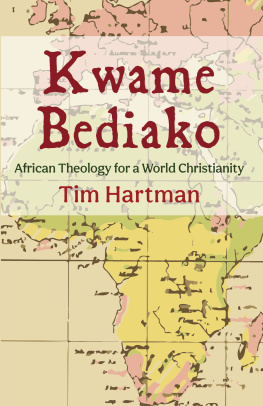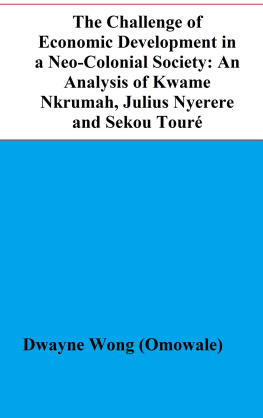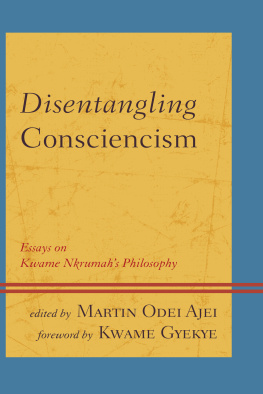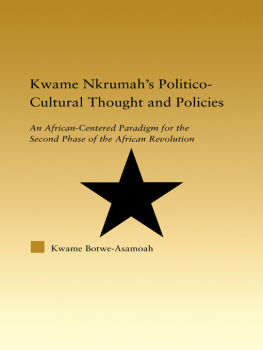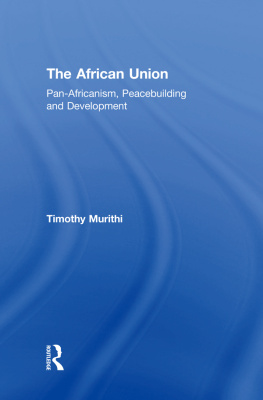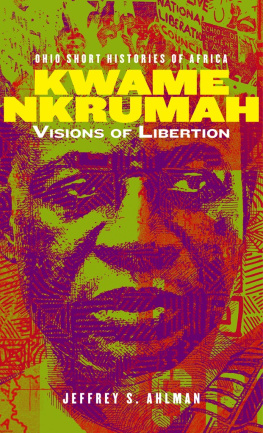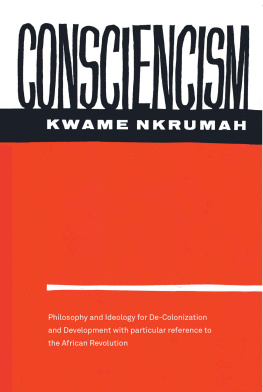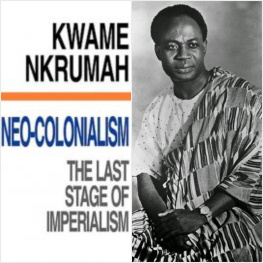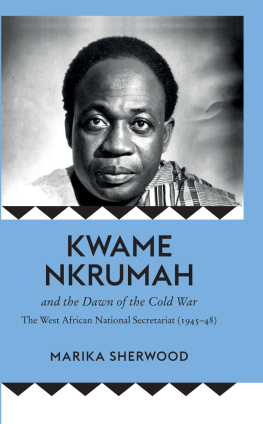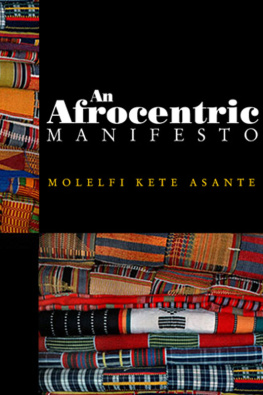Published in 2003 by
Routledge
29 West 35th Street
New York, NY 10001
Copyright 2003 by Routledge
Routledge is an imprint of the Taylor & Francis Group
This edition published in the Taylor & Francis e-Library, 2005.
To purchase your own copy of this or any of Taylor & Francis or Routledges collection of thousands of eBooks please go to www.eBookstore.tandf.co.uk.
All rights reserved. No part of this book may be reprinted or reproduced or utilized in any form or by any electronic, mechanical, or other means, now known or hereafter invented, including photcopying and recording, or in any information storage or retrieval system, without permission in writing from the publisher.
Library of Congress Cataloging-in-Publication Data
Poe, D.Zizwe (Daryl Zizwe), 1954
Kwame Nkrumahs contribution to Pan-Africanism: an Afrocentric
analysis/by D.Zizwe Poe.
p. cm.(African studies: history, politics, economics, and culture)
Includes bibliographical references and index.
ISBN 0-415-94643-3
1. Nkrumah, Kwame, 19091972Political and social views. 2. African cooperation. 3. Pan-Africanism. I. Title. II. African studies (Routledge (Firm))
DT512.3.N57P64 2003
341.249dc21
2003004068
ISBN 0-203-50537-9 Master e-book ISBN
ISBN 0-203-57724-8 (Adobe eReader Format)
Chapter 1
Introduction
The Afrocentric approach to African Area Studies and African American Studies is a relatively new and budding endeavor. It differs from other academic disciplines by concerning itself with the empowerment of Africans. Units of analysis inherited from other disciplines, however, have restricted its approach. Most of the resultant theories focus on individuals and diasporic elements. Within Africa, these scholars recognize only ethnic and linguistic groups while they attack a continental-wide African identity as being pejoratively essentialist. These models, therefore, have not satisfactorily addressed the question of African agency at macro levels.
This new approach requires agential models at the level of African nation states and the African world. The life and works of Kwame Nkrumah, including the ideology of Nkrumahism, offers a set of analytical and coherency tools with which to build an African-centered base in the study of international politics. Indeed, Nkrumah offers a revolutionary model of Pan-Africanism to the explication of African Personality studies. Nkrumahism stands as the intellectual progeny of Garveyism and the earlier works of Blyden.
The life and works of Kwame Nkrumah (19091972), the most influential agent of African liberation and organizational unity since Marcus Garvey (1887 1940), provide a useful ideological foundation and strategic models for agency to the construction of African Centered curriculums. He personally influenced and was impacted by an impressive number of anti-imperialists (some of which were Pan-African nationalists) in West Africa, East Africa, Southern Africa, Central Africa, North Africa, Europe, the Caribbean, and the United States of America. Most notable among these were W.E.B.DuBois (18681963), Amy Ashwood Garvey (18971969), Shirley DuBois (19061977), George Padmore (1902 1959), Ras T. Makonnen, Jomo Kenyatta (18941978), Tom Mboya (19301969), Milton Obote (b. 1924), Abd-el Nasser (19181970), Julius Nyerere (1922 1999), Frantz Fanon (19251961), Skou Tour (19221984), Amilcar Cabral (19211973), Patrice Lumumba (19231961), Robert Mugabe (b. 1924), Ndabaningi Sithole (b. 1920), Malcolm X (19251965), and Kwame Ture (1941 1998).
Nkrumah is inevitably mentioned in scholarly discussions that assess Pan-Africanism from the Manchester 1945 Pan-African congress onward. His work in the area of African liberation has overshadowed his early theoretic contributions to African studies. His significant contribution to African Centered thought, through the ideology of Nkrumahism, has only scant mention among Black Studies, Africa Area studies, African-American Studies, Africana Studies and Pan-African studies departments in the United States.
Nkrumahs impact on the development of the fields of Black Studies and African Area studies requires further attention in the academy. This understatement results partly from political and epistemological debates between: Afrocentrists and Eurocentrists; Black nationalists and African nationalists; Diaspora nationalists and continentals; and, capitalists and socialists.
Besides these various polemical entities, Black Studies and African Area Studies have housed debates between the languages of various disciplines. This is clearly seen on one hand by those scholars in literature fields who often find themselves wed to periodizations categorized by deconstructionism and post-modernity. The sub-categorization and pathological vantage points employed in the field of social science have helped to ossify negative images of African descendants. There are healthy exceptions. Africology, a reflection of Afrocentricity in the academy, claims its own disciplinary language and thereby circumvents the extra stress points suffered by other scholars in the field.
On the level of language, an essential component in epistemology and gnosis in general, Africology has seized the discursive ground. This proved to be a major breakthrough in the study for African agency at the personal level. Africology, however, has not clarified the role of Africas modern development. Nkrumahs experience and ideology has the potential to enrich this budding discipline with a Pan-African Centered paradigm.
Nkrumahs life personifies the development of Pan-Africanism. Nkrumah shared an early battle against a foreign colonial system and witnessed the depersonalization of his clan and larger polities. He also experienced the early urge of Black and African nationalism through his affiliation with West African intellectuals and nationalists. He spent over a decade in the metrepoles experiencing first hand the misery and promise of African descendants and immigrants. The bulk of those years were spent in the United States of America. He attended and taught at both Lincoln University and the University of Pennsylvania. and tracts; and played a key role in the historic 1945 Manchester Pan-African Congress (Fifth PAC).
From that point, Nkrumahs life was more than a metaphor of Pan-Africanism; it became the guiding force of the movement. Nkrumahs strategies were global and reached all corners of Africa and beyond. The ideology of Nkrumahism explicated epistemological and ethical principals. It also included a philosophy to under gird African agency, the central distinguishing pillar of Africology from other disciplines.
Nkrumahs reign as the personification and leader of Pan-Africanism was a period of enhanced, multileveled, African agency. Some of the factors leading to this enhanced agency predated Nkrumahs ascendancy. Significant ones, however, were directly related to his theories and policies. Specifically utilizing the resources of a modern state in the quest for organized continental unity, the assertion of a non-racial African Personality, the assertion of scientific socialism for all of Africa, a liberated zone approach to Pan-African liberation, are all attributed to the Nkrumah era of Pan-Africanism. These themes resurface in discussions around the Afrocentric postulates of Molefi Asante as explications for Africologys basis.


